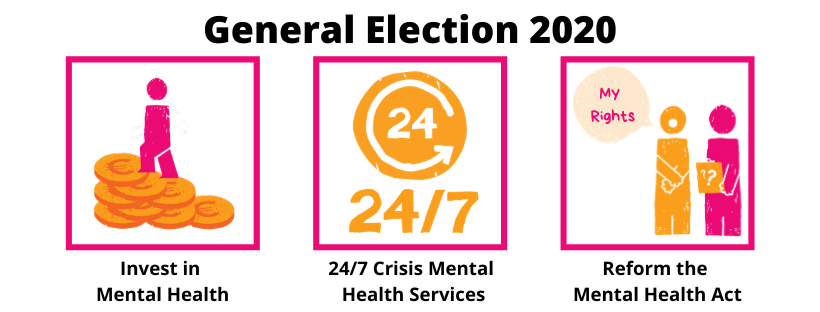
The General Election on the 8th of February 2020 must be a General Election in which mental health is given priority.
Ireland’s mental health services are in a state of crisis and have suffered from years of significant under-investment, staffing shortages and access difficulties.
Mental Health Reform have launched the General Election 2020 Manifesto and call on candidates to pledge, if elected, to implement in full these essential changes for our mental health services.
- We need substantial investment in Ireland’s mental health services: Ireland’s mental health budget must move from 6% of the overall health budget to at least 10% of the overall health budget.
- Ireland’s mental health services are not accessible 24/7: Crisis mental health services need to be accessible to every community in Ireland, for people of all ages.
- Ireland’s mental health law does not give adequate protection of people’s rights when they are in hospital for mental health treatment: The draft legislation to update the Mental Health Act, 2001, must be published in full and the law must be updated.
Get involved today and make a difference
- Like and share our posts on social media
- Tag your local candidates in our social media posts
- Ask candidates how they plan to make mental health a priority
- Donate to help make our voice louder
Key questions for candidates
- What are your plans to increase investment in mental health?
- Will you prioritise making mental health services available 24/7? How?
- How will you progress the update of Ireland’s mental health laws?
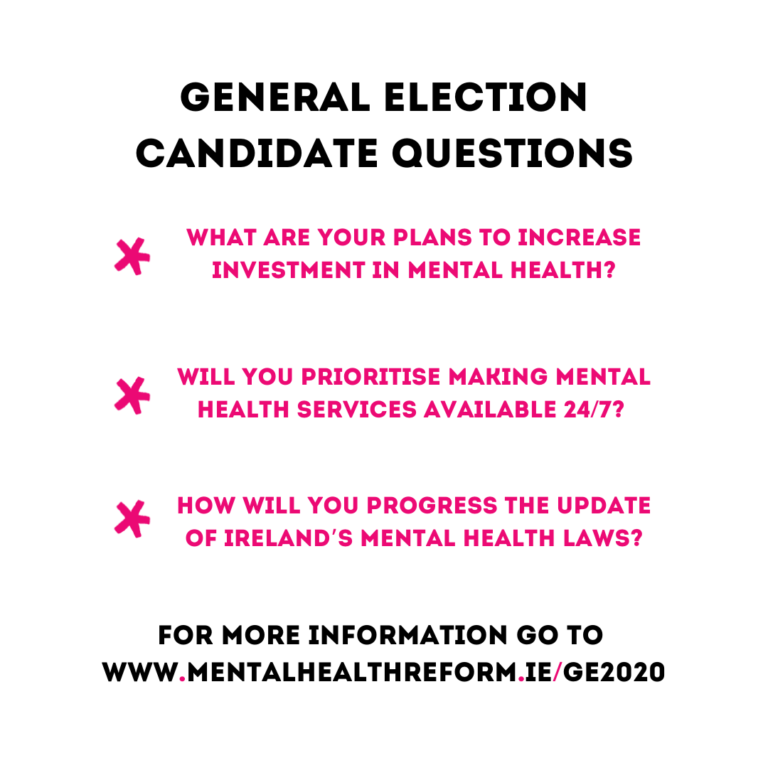
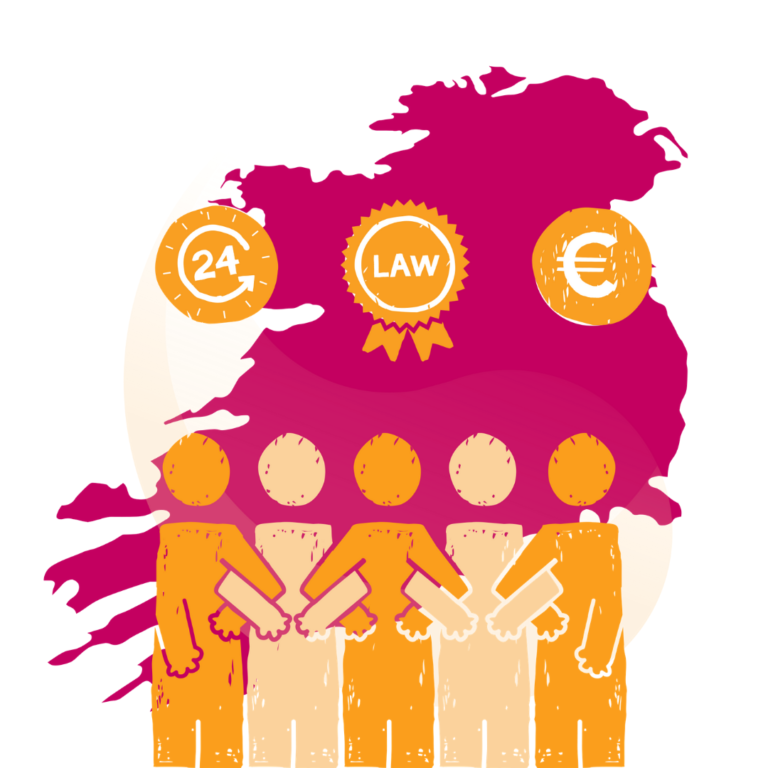
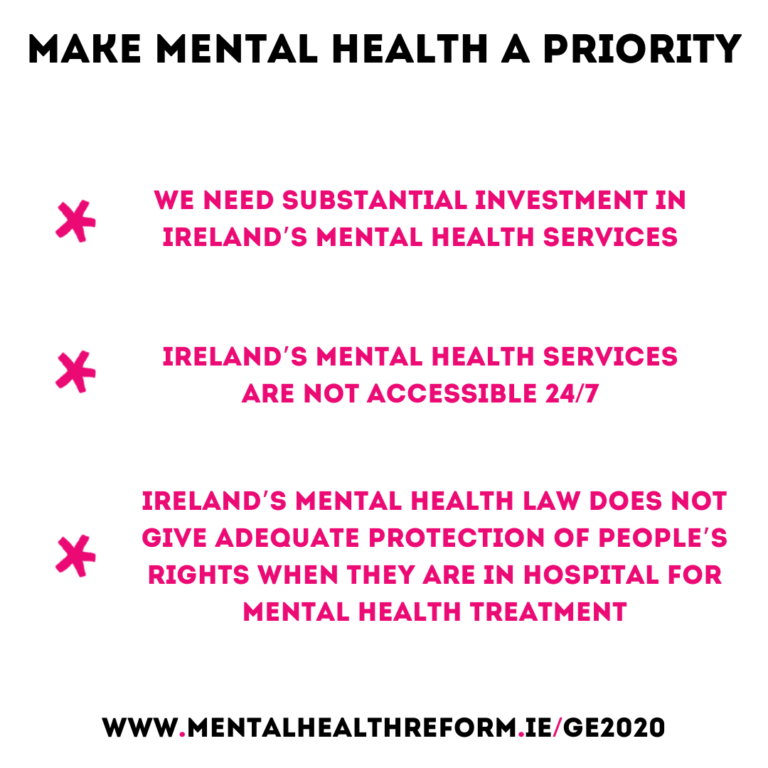
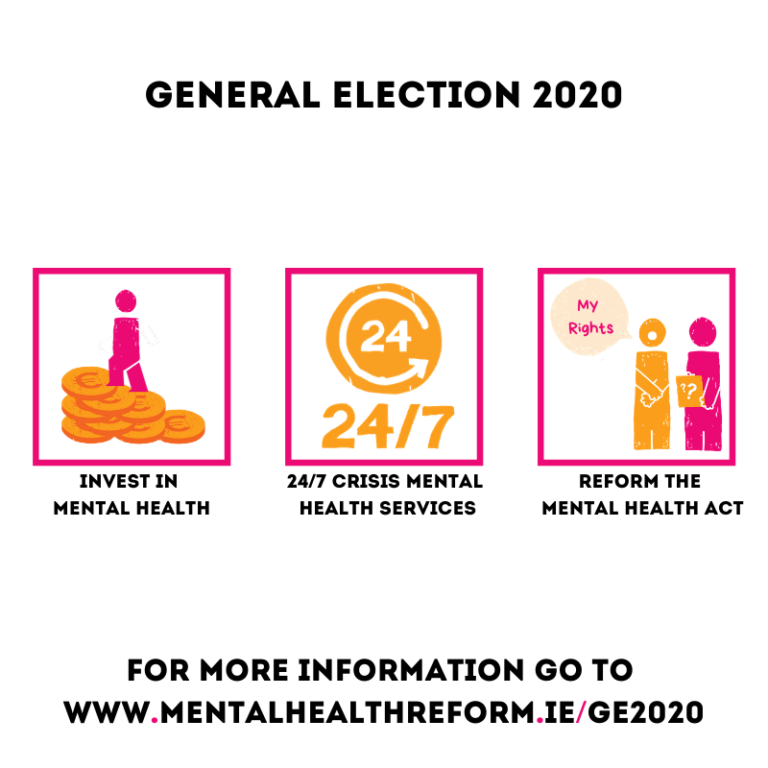
More information about the three key asks
Goal: Ireland’s mental health budget should move towards 10% of the overall health budget
Thousands of people in Ireland who might need mental health treatment, such as a talking therapy, are not getting it. Mental health services are far behind other areas of the health service and the system cannot cope with the amount of people coming forward to access supports. The mental health budget represents just 6% of the overall budget, when Government policy recommends it should be at 10% of the overall health budget.
The number of people with mental health difficulties in Ireland is significant.
- Almost 10% of the Irish population over age 15 has a ‘probable mental health problem’ at any one time.
- Almost 20% of young people aged 19-24 years having had a mental health disorder and 15% of children aged 11-13 years also having experienced a mental health disorder.
- Young Irish women are experiencing the highest levels of moderate to severe symptoms of depression compared to the EU average.
Growing demand for mental health services, at all levels of the system, has not been met with proportional increases in staff and resources for mental health services. There are fewer staff in our mental health services today than there were before the recession in 2008.
The implications of not adequately investing are seen every day in mental health services:
- Referrals to child and adolescent mental health services (CAMHS) increased by over 40% from around 12,800 in 2011 to 18,100 in 2019.
- The waiting list for a first appointment with CAMHS has remained in or around 2,000 children since at least 2016.
- At the end of 2019, more than 8,000 people were waiting for a Primary Care Psychology Appointment, many of whom were children.
- Research shows that 78% of older people with depression and 85% of older people with anxiety did not report a doctor’s diagnosis, indicating large unmet mental health need among the older population in Ireland.
There is a lack of transparency around how funding allocated to mental health is being spent. We need transparency, accountability and leadership in order to drive implementation and track expenditure against policy commitments.
Goal: Services for people of all ages experiencing a mental health crisis are available at any time, day or night, in their local community.
Everybody knows that a mental health crisis can happen at any time, day or night, weekday or weekend. Mental health services need to be available for people when a crisis occurs. This means being able to respond 24 hours a day, 7 days a week.
Yet many mental health services across Ireland are only open Monday to Friday, 9 AM to 5 PM.
Successive Governments have committed to the roll out of 7-day-per-week mental health services for adults, and while some progress has been made, many areas still do not have a 7 day-per-week mental health service for adults.
Children and young people still have no crisis supports out of hours.
Most counties in Ireland do not have 7 –day-a-week crisis mental health services for children and adolescents. Therefore, most Child and Adolescent Mental Health Services only open Monday to Friday, 9 AM to 5 PM.
This means that if a child or a young person encounters a mental health crisis in the evening or the weekend, one of the only options they or their parent has, is to go to an Emergency Department (A&E) and wait, sometimes for 8-10 hours or more for help. Everybody knows that an Emergency Department is an inappropriate environment for a child in acute distress.
This needs to change. We need crisis mental health services for children and young people outside of office hours, accessible to every community in Ireland.
“You’re not meant to be a kid in A&E waiting hours for someone to call your name” Joseph
Goal: The Government must publish in 2020 legislation to reform the Mental Health Act in full.
Ireland’s Mental Health Act, 2001 must be updated in 2020 so that people in hospital for mental healthcare have their rights adequately protected and they can feel safe accessing the mental health services they need.
People have waited long enough for this. It has been almost 5 years since the Government committed to publishing the draft legislation to reform the Mental Health Act, and today, we are still waiting.
While we wait,
- HSE community residences for people with mental health difficulties remain unregulated
- Voluntary patients do not have basic rights to information and advocacy
- Involuntary patients do not have the right to have their advance wishes about treatment respected,
- 16 and 17 year olds have no legal right to consent to admission and/or mental health treatment
- There is no independent review of the detention of people in hospital who lack capacity to make their own decisions, and who are not covered by the current Mental Health Act
The Mental Health Commission have found that some service users feel coerced, disempowered and unsupported when being admitted to a psychiatric inpatient unit and that this had a long-term negative impact on their recovery.
The Mental Health Commission has said that there is a risk that people in HSE mental health community residences may be experiencing abuse.
The law must be updated to protect people using mental health services from the risk of abuse.

